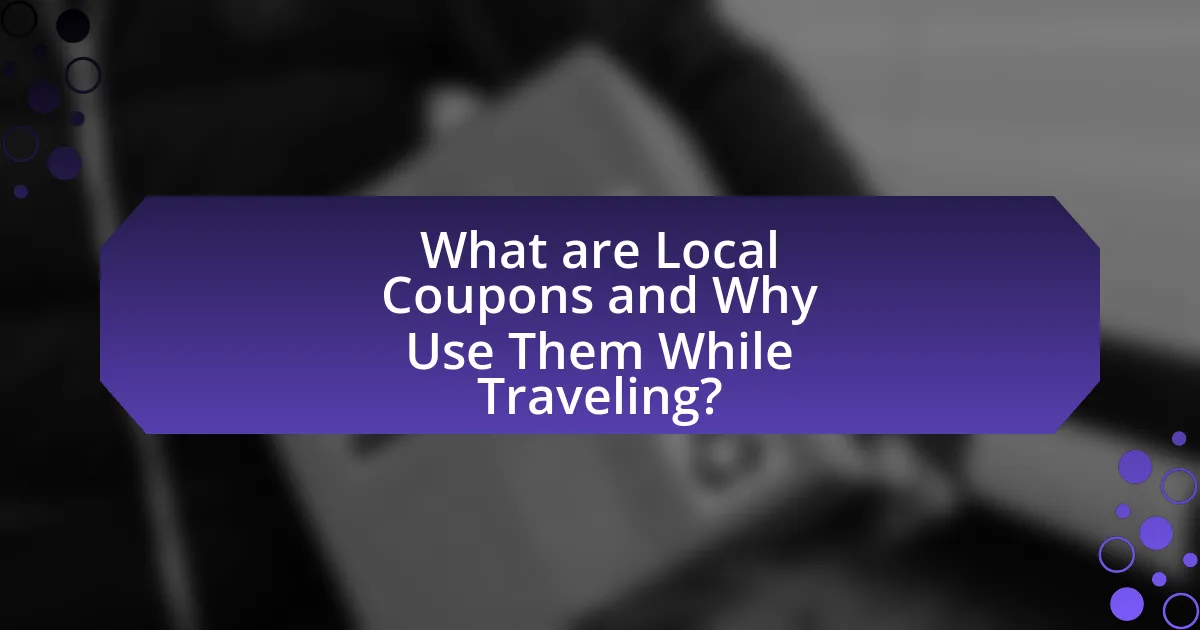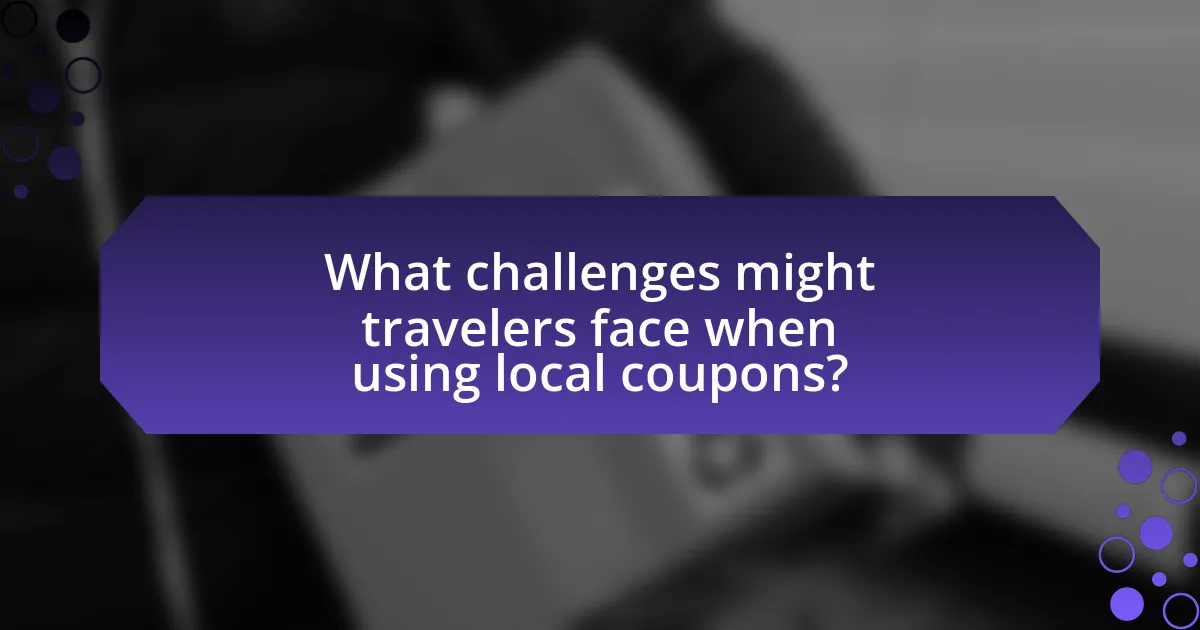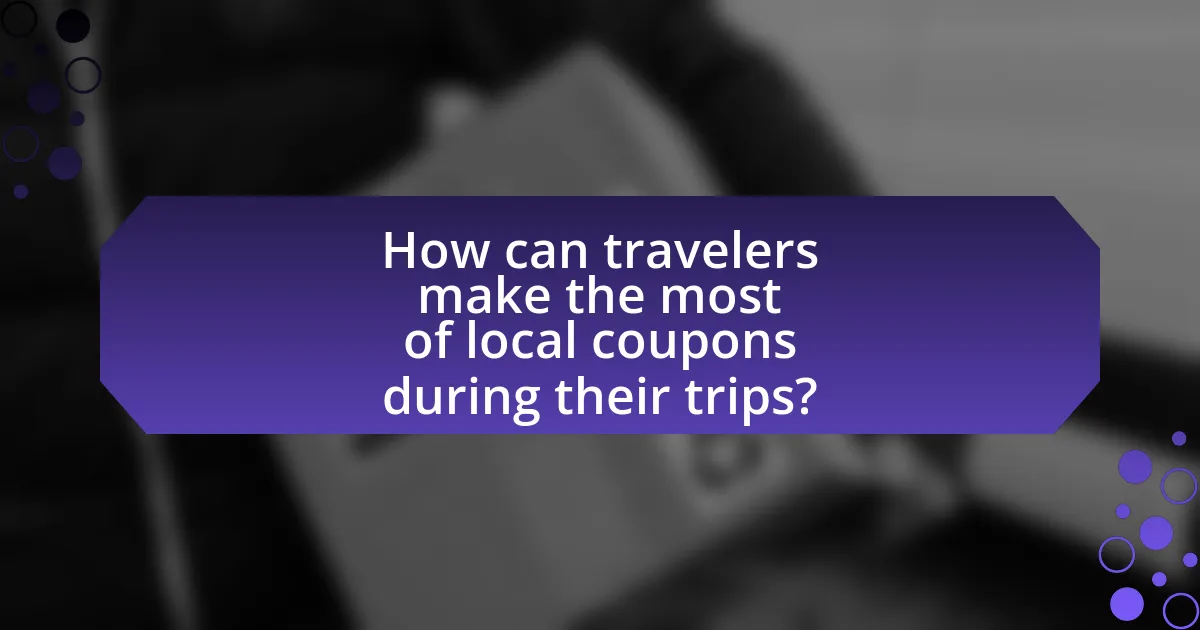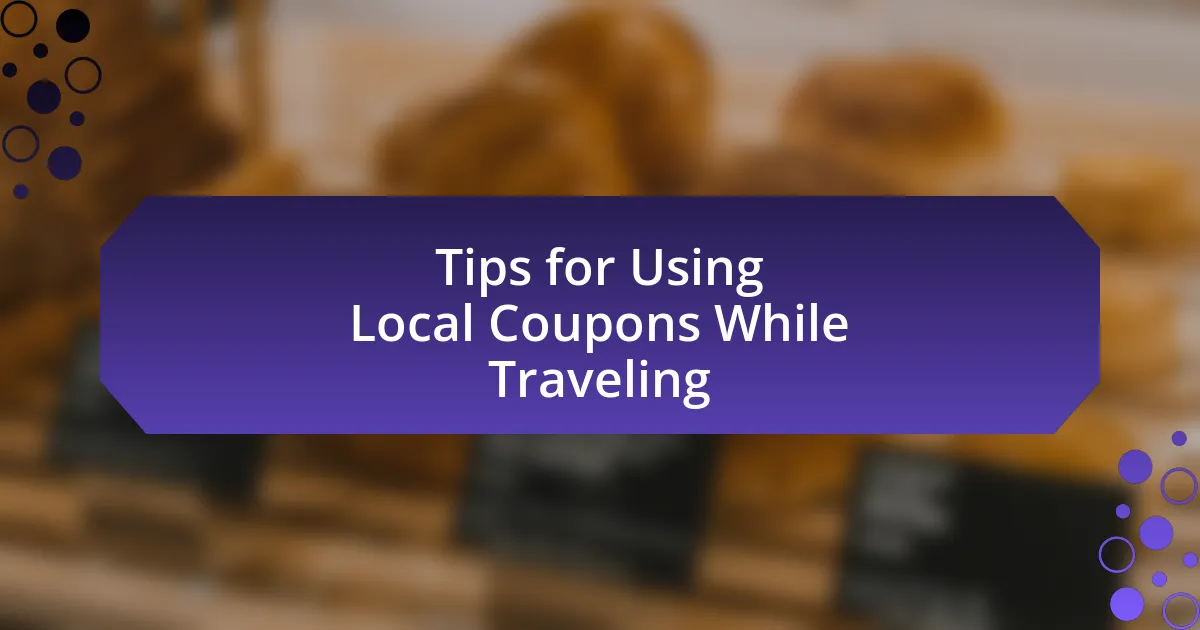Local coupons are promotional offers provided by businesses in specific areas, enabling travelers to access discounts on various products and services. Utilizing these coupons can significantly reduce travel expenses, allowing tourists to enjoy attractions, dining, and shopping at lower prices. The article outlines how local coupons enhance the travel experience by providing substantial savings, the types of discounts available, and strategies for effectively using these coupons. It also discusses where to find local coupons, common challenges travelers may face, and best practices for maximizing savings while ensuring valid usage. Overall, the article serves as a comprehensive guide for travelers looking to make the most of local coupons during their trips.

What are Local Coupons and Why Use Them While Traveling?
Local coupons are promotional offers provided by businesses in a specific area, allowing travelers to access discounts on products and services. Using local coupons while traveling can significantly reduce expenses, enabling tourists to enjoy attractions, dining, and shopping at lower prices. For instance, a study by the National Association of Coupon Professionals found that 92% of consumers use coupons to save money, highlighting their effectiveness in budget management. Additionally, local coupons often promote unique experiences and local businesses, fostering a deeper connection to the destination.
How do local coupons enhance the travel experience?
Local coupons enhance the travel experience by providing significant savings on attractions, dining, and activities, allowing travelers to explore more within their budget. These coupons often offer discounts that can lead to experiences that might otherwise be unaffordable, such as entry to popular tourist sites or local restaurants. For instance, a study by the National Association of Travel Agents found that travelers using coupons reported a 30% increase in the number of activities they could afford, leading to a richer and more diverse travel experience.
What types of discounts can travelers expect from local coupons?
Travelers can expect various types of discounts from local coupons, including percentage-off deals, buy-one-get-one-free offers, and fixed-amount discounts on services or products. These coupons often apply to restaurants, attractions, and retail stores, providing significant savings. For instance, a study by the Local Coupon Association found that consumers can save an average of 10-50% on their purchases when utilizing local coupons, demonstrating their effectiveness in reducing travel expenses.
How do local coupons contribute to budget-friendly travel?
Local coupons significantly contribute to budget-friendly travel by providing travelers with discounts on various services and attractions. These coupons can reduce costs for dining, entertainment, and activities, allowing travelers to experience more within their budget. For instance, a study by the National Association of Travel Agents found that travelers who utilized local coupons saved an average of 20% on their overall trip expenses. This savings can be crucial for maximizing the travel experience while minimizing financial strain.
Where can travelers find local coupons?
Travelers can find local coupons through various sources such as tourism websites, local newspapers, and coupon apps. Tourism websites often feature discounts and promotions specific to the area, while local newspapers frequently include coupon sections for nearby businesses. Additionally, coupon apps like Groupon and RetailMeNot provide access to a wide range of local deals and offers, making it easier for travelers to save money during their trips.
What online resources are available for finding local coupons?
Online resources for finding local coupons include websites like RetailMeNot, Coupons.com, and Groupon. These platforms aggregate various local deals and discounts from businesses, allowing users to search by location and category. RetailMeNot features user-submitted coupons and cashback offers, while Coupons.com provides printable and digital coupons for grocery stores and retailers. Groupon specializes in local experiences and services, offering significant discounts on activities, dining, and travel. These resources are widely recognized for their extensive databases and user-friendly interfaces, making them reliable options for travelers seeking local savings.
How can travelers utilize local businesses for coupon access?
Travelers can utilize local businesses for coupon access by directly engaging with those businesses, often through their websites, social media pages, or in-store promotions. Many local establishments offer exclusive discounts or coupons to attract customers, which can be found on platforms like Yelp, Groupon, or local tourism websites. Additionally, travelers can ask locals for recommendations on where to find the best deals, as many businesses may not advertise their coupons widely. This approach not only provides access to savings but also supports the local economy.
What are the best practices for using local coupons effectively?
The best practices for using local coupons effectively include researching available coupons before traveling, understanding the terms and conditions, and planning purchases around the discounts. Researching allows travelers to identify the most valuable offers, while understanding the terms ensures that they can use the coupons without issues, such as expiration dates or restrictions. Planning purchases around the discounts maximizes savings, as travelers can align their spending with the best deals available. According to a study by the National Retail Federation, 68% of consumers reported using coupons to save money while shopping, highlighting the effectiveness of this strategy.
How can travelers ensure they are using valid and up-to-date coupons?
Travelers can ensure they are using valid and up-to-date coupons by checking the expiration dates and terms of use on the coupons before attempting to redeem them. Many coupons have specific conditions, such as being valid only on certain days or requiring a minimum purchase. Additionally, travelers should verify the coupons through the issuing company’s website or customer service to confirm their validity. Research indicates that approximately 30% of coupons go unused due to expiration, highlighting the importance of checking these details to maximize savings while traveling.
What strategies can maximize savings with local coupons?
To maximize savings with local coupons, consumers should strategically plan their purchases around the coupons available. This involves researching local deals before traveling, utilizing coupon apps that aggregate offers, and timing purchases to coincide with sales events. For instance, studies show that consumers can save up to 30% on average when using coupons in conjunction with sales promotions. Additionally, stacking coupons with loyalty programs can further enhance savings, as many retailers allow the use of multiple discounts on a single transaction.

What challenges might travelers face when using local coupons?
Travelers might face several challenges when using local coupons, including restrictions on usage, expiration dates, and limited availability. Many coupons have specific terms that restrict their use to certain days or times, which can complicate travel plans. Additionally, coupons often have expiration dates that may not align with the traveler’s schedule, leading to missed opportunities for savings. Furthermore, some local businesses may limit the number of coupons they accept or may not honor them at all, creating uncertainty for travelers relying on these discounts. According to a study by the Coupon Information Corporation, approximately 30% of coupons go unused due to such restrictions, highlighting the potential difficulties travelers may encounter.
How can travelers overcome common issues with local coupons?
Travelers can overcome common issues with local coupons by thoroughly researching the terms and conditions before use. Many coupons have restrictions such as expiration dates, specific locations, or minimum purchase requirements that can lead to disappointment if not understood in advance. For instance, a study by the Coupon Information Corporation found that 90% of consumers who use coupons report issues related to expiration dates or restrictions. By checking these details online or contacting the business directly, travelers can ensure they maximize their savings and avoid frustration.
What should travelers do if a coupon is not honored?
Travelers should first inquire with the establishment about the reason the coupon is not being honored. If the issue remains unresolved, they should document the coupon details and the refusal, then contact the coupon issuer for assistance. This approach is supported by consumer protection guidelines, which recommend that customers report discrepancies to ensure accountability and potentially receive compensation or a resolution.
How can language barriers affect coupon usage?
Language barriers can significantly hinder coupon usage by preventing consumers from understanding the terms, conditions, and value of the coupons. When individuals cannot comprehend the language in which the coupon is written, they may miss out on discounts or fail to use the coupon correctly, leading to frustration and lost savings. For instance, a study by the American Marketing Association found that 70% of non-native speakers reported difficulty in understanding promotional materials, which directly impacts their purchasing decisions and coupon redemption rates.
What are the limitations of local coupons while traveling?
Local coupons while traveling have several limitations, including geographic restrictions, expiration dates, and limited applicability. Geographic restrictions mean that coupons may only be valid in specific areas, making them useless if travelers venture outside those locations. Expiration dates can render coupons invalid before they can be used, especially if travelers have tight schedules. Additionally, many coupons apply only to certain products or services, limiting their usefulness if travelers seek a broader range of options. These factors collectively hinder the effectiveness of local coupons for travelers.
Are there restrictions on the types of services or products that coupons can be used for?
Yes, there are restrictions on the types of services or products that coupons can be used for. Coupons often have specific terms and conditions that limit their applicability to certain items or services, such as excluding sale items, specific brands, or particular categories like alcohol or tobacco. For example, many grocery store coupons cannot be used on items that are already discounted or on products that are not part of the store’s regular inventory. These restrictions are typically outlined in the fine print of the coupon, ensuring that consumers are aware of the limitations before attempting to redeem them.
How do expiration dates impact the usability of local coupons?
Expiration dates significantly limit the usability of local coupons by determining the timeframe in which they can be redeemed. Coupons that have expired are typically considered invalid, meaning consumers cannot use them to receive discounts or offers. According to a survey by RetailMeNot, 60% of consumers reported that they have missed out on savings due to expired coupons, highlighting the importance of being aware of expiration dates. Therefore, understanding and tracking these dates is crucial for maximizing savings while using local coupons.

How can travelers make the most of local coupons during their trips?
Travelers can make the most of local coupons during their trips by researching and collecting them before arrival. This proactive approach allows travelers to identify the best deals available in their destination, such as discounts on attractions, dining, and shopping. For instance, a study by the National Association of Coupon Professionals indicates that 92% of consumers use coupons to save money, highlighting their effectiveness. Additionally, travelers should utilize mobile apps and websites that aggregate local coupons, ensuring they have access to the latest offers. By planning ahead and leveraging technology, travelers can maximize their savings and enhance their overall travel experience.
What tips can help travelers effectively integrate local coupons into their itineraries?
Travelers can effectively integrate local coupons into their itineraries by planning ahead and researching available discounts before their trip. This proactive approach allows travelers to identify attractions, restaurants, and services that offer coupons, ensuring they can maximize savings. For instance, websites and apps like Groupon or local tourism boards often provide curated lists of deals that can be easily accessed and incorporated into daily plans. Additionally, travelers should prioritize flexibility in their schedules to accommodate coupon usage, as some deals may have specific time restrictions or require advance reservations. By combining these strategies, travelers can enhance their experiences while minimizing costs.
How can planning ahead enhance the use of local coupons?
Planning ahead enhances the use of local coupons by allowing travelers to strategically select destinations and activities that align with available discounts. By researching local coupons in advance, travelers can identify the best deals for attractions, dining, and shopping, ensuring they maximize savings during their trip. For instance, a study by the National Association of Coupon Users found that consumers who plan their purchases around available coupons save an average of 20% on their overall spending. This proactive approach not only increases the likelihood of utilizing coupons effectively but also helps in budgeting and prioritizing experiences, leading to a more enjoyable travel experience.
What role does flexibility play in utilizing local coupons?
Flexibility plays a crucial role in utilizing local coupons by allowing travelers to adapt their plans based on available deals. When travelers remain open to changing their itinerary or dining choices, they can take advantage of time-sensitive offers or discounts that may not align with their original plans. For instance, a study by the National Restaurant Association found that 70% of consumers are more likely to visit a restaurant if they have a coupon, indicating that flexibility can lead to enhanced savings and experiences. By being willing to adjust their schedules, travelers can maximize the benefits of local coupons, ultimately leading to a more cost-effective and enjoyable trip.
What are some common mistakes to avoid when using local coupons?
Common mistakes to avoid when using local coupons include not checking expiration dates, overlooking restrictions, and failing to read the fine print. Expiration dates can render a coupon useless, while restrictions may limit the coupon’s applicability to certain items or times. Additionally, not combining coupons with sales can lead to missed savings opportunities. According to a survey by RetailMeNot, 70% of consumers reported that they often forget to check for restrictions, which can lead to frustration and wasted time.
How can travelers avoid missing out on better deals?
Travelers can avoid missing out on better deals by actively researching and utilizing local coupons available in their destination. Many cities offer discount programs, promotional websites, or mobile apps that provide access to coupons for attractions, dining, and shopping. For instance, platforms like Groupon or local tourism websites often feature significant savings that can enhance the travel experience. Additionally, subscribing to newsletters from local businesses can yield exclusive offers and timely notifications about sales. By leveraging these resources, travelers can ensure they are informed about the best deals available during their trip.
What should travelers be cautious about when using multiple coupons?
Travelers should be cautious about the terms and conditions associated with multiple coupons, as they can vary significantly between offers. Using multiple coupons may lead to confusion regarding expiration dates, restrictions on combining offers, or specific usage requirements that could invalidate one or more coupons. For example, some retailers explicitly state that only one coupon can be used per transaction, which means attempting to use multiple coupons could result in the rejection of all coupons. Additionally, travelers should be aware of potential minimum purchase requirements that may not be met when combining coupons, leading to unexpected costs.
What are the key takeaways for using local coupons while traveling?
Using local coupons while traveling can significantly enhance your experience and save money. Key takeaways include researching available coupons before your trip, as many destinations offer digital or printed coupons through local tourism websites or apps. Additionally, understanding the terms and conditions of each coupon is crucial, as restrictions on usage can vary widely. For instance, some coupons may only be valid during specific hours or require a minimum purchase. Furthermore, engaging with local businesses can lead to additional discounts or promotions not widely advertised. According to a study by the National Association of Travel Agents, travelers who utilize local coupons can save an average of 20% on dining and attractions, making it a practical strategy for budget-conscious travelers.



